Akbar Thomas Resources and Education

Seeking Justice Amid Tragedy: Understanding Wrongful Death Lawsuits
No matter the cause, the death of a loved one is tragic. However, the depth of the tragedy is compounded when the loved one’s demise was caused by the negligence, recklessness, or misconduct of others. The grief surviving family members have over the loss is typically made more tumultuous by feelings of shock, denial, anger, and perhaps guilt for being unable to prevent the incident that caused the wrongful death.
While there’s little surviving family members can do to overcome their emotions, they can secure some measure of justice by seeking damages through a wrongful death lawsuit. Given the complexities of wrongful death litigation in Florida, you should always consult with an experienced injury lawyer before filing a claim. With extensive working experience with wrongful death claims, Mutaqee Akbar and Brandi Thomas of Tallahassee’s Akbar Thomas Law details how the wrongful death claims process works below. And if you feel that your loved one’s death was caused in whole or part by the actions of others, Mutaqee can investigate the death to determine potential negligence and strategize an effective approach to secure damages from the liable party(ies).
Understanding Wrongful Death Lawsuits
Under Florida statutes, wrongful death is covered under Sections 768.16 through 768.28 of the state’s personal injury law. As noted by Section 768.17, the law’s legislative intent is to “shift the losses resulting when wrongful death occurs from the survivors of the decedent to the wrongdoer.” Under Section 768.19, survivors or the decedent’s estate can pursue a wrongful death claim when the death involves two parameters:
- “[Was] caused by the wrongful act, negligence, default, or breach of contract or warranty of any person, including those occurring on navigable waters.”
- “[T]he event would have entitled the person injured to maintain an action and recover damages if death had not ensued.”
To prove negligence in a wrongful death claim, the plaintiff must present evidence showing that the at-fault party owed a duty of care to act in ways not harmful to others and that they breached this duty of care concerning the wrongful death. Duty of care covers many scenarios and can be breached by negligence, recklessness, carelessness, or misconduct. For example, drivers have a duty of care to follow traffic laws and drive responsibly. Property owners have a duty of care to ensure that their premises do not have any hazards that can injure (or kill) people. Product manufacturers must ensure that their products are safe for consumers. Boat operators must operate their craft safely and according to regulations (i.e., boats must have life vests and other safety gear). Medical personnel have a duty to care for patient’s health without doing harm.
Common Scenarios Leading to Wrongful Death Claims
With thousands of fatalities annually, traffic accidents are Florida’s leading cause of wrongful death claims. Driving under the influence, reckless driving, speeding, distracted driving, and numerous other fatal accident causes represent a duty of care breach subject to a wrongful death claim. Likewise, with traffic accidents involving pedestrians or bicyclists, as Florida Statute 316.130(15) requires drivers to “exercise due to care to avoid colliding with any pedestrian or any person propelling a human-powered vehicle.”
Slip and fall accidents happen all the time, and some result in fatalities. If the slip and fall occurred on someone else’s property and can be attributed to a failure to maintain the property safety, survivors may have grounds for a wrongful death claim. For example, if a store owner fails to clean up a slippery surface or provide adequate warning about it, they would likely be liable for any resultant slip and fall death.
Despite being highly trained, medical care workers are human and thus can make mistakes. Misdiagnosis, cutting corners, surgical errors, medication mistakes, and failing to follow proper protocols are all medical malpractice grounds for a wrongful death claim if they result in the death of a patient.
Other grounds for a wrongful death claim include:
Workplace accidents—insufficient safety measures, construction site mishaps, industrial accidents, and unsafe working conditions may be the fault of the employer or worksite premises owner.
Preventable child deaths—lapse in judgment, inattention, or distraction by child caretakers can put children in fatal situations, as can negligence by property owners. Accidental drowning is the number one cause of death for children under four and is usually preventable.
Defective products— When a product defect fatally injures a person, the manufacturer may be liable for the wrongful death.
Aviation accident—if caused by human error or defective airplane parts, a wrongful death claim may be warranted.
Criminal acts—intentional criminal acts that lead to someone’s death represent gross misconduct subject to Florida’s wrongful death liability law.
Compensation and Damages in Wrongful Death Lawsuits
Under Florida law, successful wrongful death claims are paid to the decedent’s family and the estate to compensate them for economic and non-economic damages. Damages paid to the family include:
- Loss of support and services.
- Loss of companionship, protection, guidance, and instruction.
- Medical and funeral expenses (if paid by survivors).
Damages paid to the decedent’s estate include:
- Loss of net accumulations (what the decedent may have had in their estate had they lived an entire average lifespan).
- Lost earnings.
- Medical and funeral expenses (if paid by the estate).
In intentional or malicious misconduct cases, the plaintiffs may also seek punitive damages. Under Florida law, punitive damages are limited to three times the compensatory damages awarded or $500,000, whichever is greater. If the misconduct causing the fatality was motivated by financial gain, the limits rise to the greater of four times the compensatory damages or $2 million.
Your Lawyer’s Role in a Wrongful Death Lawsuit
If you believe that negligence or misconduct caused your loved one’s death, a skilled personal injury lawyer will first gather relevant evidence and investigate the incident causing the death. If your lawyer establishes a clear case of negligence, your lawyer will prepare the complaint and file it with the court. The filing names the alleged negligent parties, a description of the negligence actions that led to the death, and the damage amounts the decedent’s estate is seeking.
In many cases, the defendant and/or his insurance company will conduct negotiations to settle the matter without a trial, and the court may push for mediation. Your lawyer will negotiate with the defense to secure a reasonable settlement based on the strength of evidence supporting the claim.
If negotiations fail to settle, the case goes to trial, which involves several phases, including discovery, disposition of pre-trial motions, and the actual trial with the presentation of evidence and witness testimony. Settlement negotiations often continue during the trial, sometimes leading to a resolution before a verdict is rendered.
Learn More About Making a Wrongful Death Claim—Contact Us Today!
Nothing can fully compensate you for losing a loved one killed by negligence, recklessness, or misconduct. However, with a wrongful death lawsuit, you may be able to secure some amends by holding the negligent party(ies) responsible. Given the complexities of Florida law, a skilled personal injury lawyer represents your best option for ensuring that you will receive just compensation for the loss of your loved one.
With more than two decades of Tallahassee-area wrongful death practice, Akbar Thomas Law’s personal injury legal team can provide you with expert guidance designed to secure full and just compensation for the wrongful death of your loved one. To learn more, contact us today at 850-383-0000 or start a conversation with our chatbot by clicking the “Live Chat” box.

